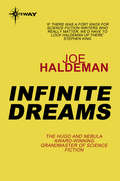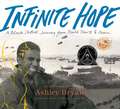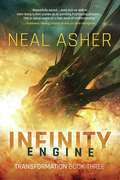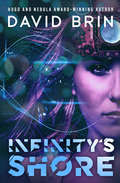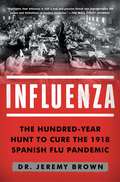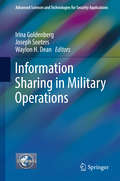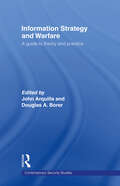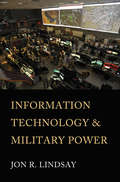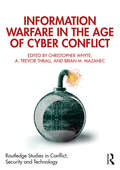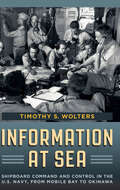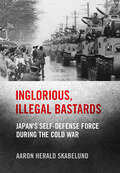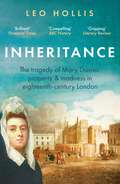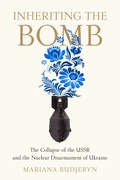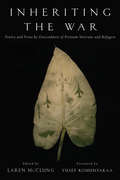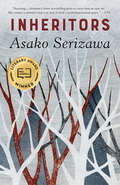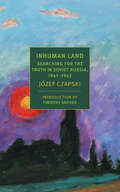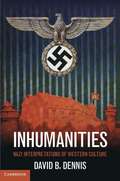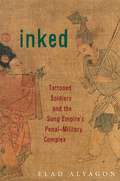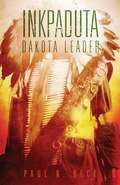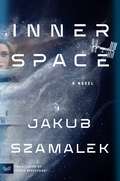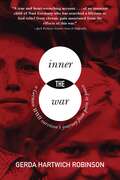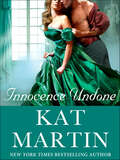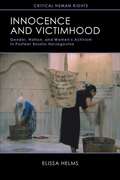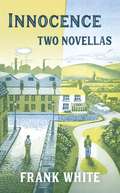- Table View
- List View
Infinite Dreams: Stories
by Joe HaldemanThe vast silent sweep of infinite space, the limitless confines of a man's skull - thirteen dazzling stories including the Hugo-winning Tricentennial.
Infinite Hope: A Black Artist's Journey from World War II to Peace
by Ashley BryanThis book details artist Ashley Bryan's experiences as a Black soldier in the segregated army of WWII, and how love and the pursuit of art sustained him. In May of 1942, at the age of eighteen, Ashley Bryan was drafted to fight in World War II. For the next three years, he would face the horrors of war as a black soldier in a segregated army. He endured the terrible lies white officers told about the black soldiers to isolate them from anyone who showed kindness - including each other. He received worse treatment than even Nazi POWs. He was assigned the grimmest, most horrific tasks, like burying fallen soldiers-but was told to remove the black soldiers first because the media didnot want them in their newsreels. And he waited and wanted so desperately to go home, watching every white soldier get safe passage back to the United States before black soldiers were even a thought. For the next forty years, Ashley would keep his time in the war a secret. But now, he tells his story. The story of the kind people who supported him. The story of the bright moments that guided him through the dark. And the story of his passion for art that would save him time and time again. Filled with never-before-seen artwork and handwritten letters and diary entries, this illuminating and moving memoir by Newbery Honor-winning illustrator Ashley Bryan is both a lesson in history and a testament to hope.
Infinity Engine: Transformation Book Three (Transformations)
by Neal AsherIn the outskirts of space, and the far corners of the Polity, complex dealings are in play. Several forces continue to pursue the deadly and enigmatic Penny Royal, none more dangerous than the Brockle, a psychopathic forensics AI and criminal who has escaped the Polity&’s confinements and is upgrading itself in anticipation of a deadly showdown, becoming ever more powerful and intelligent. Aboard Factory Station Room 101, the behemoth war factory that birthed Penny Royal, groups of humans, alien prador, and AI war drones grapple for control. The stability of the ship is complicated by the arrival of a gabbleduck known as the Weaver, the last living member of the ancient and powerful Atheter alien race. What would an Atheter want with the complicated dealings of Penny Royal? Are the Polity and prador forces playing right into the dark AI&’s hand, or is it the other way around? Set pieces align in the final book of Neal Asher&’s action-packed Transformation trilogy, pointing to a showdown on the cusp of the Layden&’s Sink black hole, inside of which lies a powerful secret, one that could destroy the entire Polity.
Infinity's Shore (The Uplift Saga #5)
by David BrinA once peaceful planet of refugees faces complete annihilation in this hard science fiction sequel to Brightness Reef.Book Two in the Uplift Storm TrilogyIt&’s illegal to occupy the planet Jijo, but six castaway races have managed to coexist there for some time. They&’ve successfully hidden from watchful law enforcers of the Five Galaxies—until now . . .After making an amazing discovery far away—a derelict armada whose mere existence triggered interstellar war—the Terran exploration vessel Streaker and its crew of humans and dolphins arrive at Jijo in search of sanctuary from the Galactic forces out to destroy them.But they were followed. As behemoth Galactic starships descend upon Jijo, heroic—and terrifying—choices must be made. Together, human and alien settlers must choose whether to fight the invaders or join them. The crew of the Streaker, meanwhile, discovers something that just might save Jijo and its inhabitants . . . or destroy every last one of them.&“Well paced, immensely complex, highly literate . . . Superior SF.&” —Publishers Weekly, starred review&“An imaginative drama of excitement and wonder . . . The sheer virtuosity of the prose alone makes this book worth reading.&” —SF Site
Influenza: The Hundred Year Hunt to Cure the Deadliest Disease in History
by Jeremy BrownOn the 100th anniversary of the devastating pandemic of 1918, Jeremy Brown, a veteran ER doctor, explores the troubling, terrifying, and complex history of the flu virus, from the origins of the Great Flu that killed millions, to vexing questions such as: are we prepared for the next epidemic, should you get a flu shot, and how close are we to finding a cure? <P><P>While influenza is now often thought of as a common and mild disease, it still kills over 30,000 people in the US each year. Dr. Jeremy Brown, currently Director of Emergency Care Research at the National Institutes of Health, expounds on the flu's deadly past to solve the mysteries that could protect us from the next outbreak. <P><P>In Influenza, he talks with leading epidemiologists, policy makers, and the researcher who first sequenced the genetic building blocks of the original 1918 virus to offer both a comprehensive history and a roadmap for understanding what’s to come. Dr. Brown digs into the discovery and resurrection of the flu virus in the frozen victims of the 1918 epidemic, as well as the bizarre remedies that once treated the disease, such as whiskey and blood-letting. \ <P><P>Influenza also breaks down the current dialogue surrounding the disease, explaining the controversy over vaccinations, antiviral drugs like Tamiflu, and the federal government’s role in preparing for pandemic outbreaks. Though 100 years of advancement in medical research and technology have passed since the 1918 disaster, Dr. Brown warns that many of the most vital questions about the flu virus continue to confound even the leading experts. <P><P>Influenza is an enlightening and unnerving look at a shapeshifting deadly virus that has been around long before people—and warns us that it may be many more years before we are able to conquer it for good.
Information Sharing in Military Operations
by Joseph Soeters Irina Goldenberg Waylon H. DeanThis volume explores the interpersonal, organizational, and technological enablers and barriers to information and intelligence sharing in multinational and multiagency military, humanitarian, and counterterrorism operations. To this end the contributions present case studies and other empirical research. UN and special operations headquarters are studied, along with multinational operations in Mali, Iraq, and Afghanistan by the UN and by U. S. Central Command. Perennial themes are the need for a holistic approach to information sharing--one that incorporates all the above enablers--and the importance of learning from experience, which should be the basis for operational planning. There is still considerable ground to be gained in enhancing the efficacy of information sharing in the context of defense and security, and the present book contributes to this goal.
Information Strategy and Warfare: A Guide to Theory and Practice
by John Arquilla Douglas A. BorerThis volume develops information strategy as a construct equal in importance to military strategy as an influential tool of statecraft.John Arquilla and Douglas A. Borer explore three principal themes:the rise of theinformation domain and information strategy as an equal partner alongside traditional military strategythe need to consider the org
Information Technology and Military Power (Cornell Studies in Security Affairs)
by Jon R. LindsayMilitaries with state-of-the-art information technology sometimes bog down in confusing conflicts. To understand why, it is important to understand the micro-foundations of military power in the information age, and this is exactly what Jon R. Lindsay's Information Technology and Military Power gives us. As Lindsay shows, digital systems now mediate almost every effort to gather, store, display, analyze, and communicate information in military organizations. He highlights how personnel now struggle with their own information systems as much as with the enemy.Throughout this foray into networked technology in military operations, we see how information practice—the ways in which practitioners use technology in actual operations—shapes the effectiveness of military performance. The quality of information practice depends on the interaction between strategic problems and organizational solutions. Information Technology and Military Power explores information practice through a series of detailed historical cases and ethnographic studies of military organizations at war. Lindsay explains why the US military, despite all its technological advantages, has struggled for so long in unconventional conflicts against weaker adversaries. This same perspective suggests that the US retains important advantages against advanced competitors like China that are less prepared to cope with the complexity of information systems in wartime. Lindsay argues convincingly that a better understanding of how personnel actually use technology can inform the design of command and control, improve the net assessment of military power, and promote reforms to improve military performance. Warfighting problems and technical solutions keep on changing, but information practice is always stuck in between.
Information Warfare in the Age of Cyber Conflict (Routledge Studies in Conflict, Security and Technology)
by Christopher Whyte Brian M. Mazanec Trevor ThrallThis book examines the shape, sources and dangers of information warfare (IW) as it pertains to military, diplomatic and civilian stakeholders. Cyber warfare and information warfare are different beasts. Both concern information, but where the former does so exclusively in its digitized and operationalized form, the latter does so in a much broader sense: with IW, information itself is the weapon. The present work aims to help scholars, analysts and policymakers understand IW within the context of cyber conflict. Specifically, the chapters in the volume address the shape of influence campaigns waged across digital infrastructure and in the psychology of democratic populations in recent years by belligerent state actors, from the Russian Federation to the Islamic Republic of Iran. In marshalling evidence on the shape and evolution of IW as a broad-scoped phenomenon aimed at societies writ large, the authors in this book present timely empirical investigations into the global landscape of influence operations, legal and strategic analyses of their role in international politics, and insightful examinations of the potential for democratic process to overcome pervasive foreign manipulation. This book will be of much interest to students of cybersecurity, national security, strategic studies, defence studies and International Relations in general.
Information at Sea: Shipboard Command and Control in the U.S. Navy, from Mobile Bay to Okinawa (Johns Hopkins Studies in the History of Technology)
by Timothy S. WoltersThis is the first book to explore information management at sea as practiced by the U.S. Navy from the Civil War to World War II.The brain of a modern warship is its combat information center (CIC). Data about friendly and enemy forces pour into this nerve center, contributing to command decisions about firing, maneuvering, and coordinating. Timothy S. Wolters has written the first book to investigate the history of the CIC and the many other command and control systems adopted by the U.S. Navy from the Civil War to World War II. What institutional ethos spurred such innovation? Information at Sea tells the fascinating stories of the naval and civilian personnel who developed an array of technologies for managing information at sea, from signal flares and radio to encryption machines and radar.Wolters uses previously untapped archival sources to explore how one of America's most technologically oriented institutions addressed information management before the advent of the digital computer. He argues that the human-machine systems used to coordinate forces were as critical to naval successes in World War II as the ships and commanders more familiar to historians.
Inglorious, Illegal Bastards: Japan's Self-Defense Force during the Cold War (Studies of the Weatherhead East Asian Institute, Columbia University)
by Aaron SkabelundIn Inglorious, Illegal Bastards, Aaron Herald Skabelund examines how the Self-Defense Force (SDF)—the post–World War II Japanese military—and specifically the Ground Self-Defense Force (GSDF), struggled for legitimacy in a society at best indifferent to them and often hostile to their very existence.From the early iterations of the GSDF as the Police Reserve Force and the National Safety Force, through its establishment as the largest and most visible branch of the armed forces, the GSDF deployed an array of public outreach and public service initiatives, including off-base and on-base events, civil engineering projects, and natural disaster relief operations. Internally, the GSDF focused on indoctrination of its personnel to fashion a reconfigured patriotism and esprit de corps. These efforts to gain legitimacy achieved some success and influenced the public over time, but they did not just change society. They also transformed the force itself, as it assumed new priorities and traditions and contributed to the making of a Cold War defense identity, which came to be shared by wider society in Japan. As Inglorious, Illegal Bastards demonstrates, this identity endures today, several decades after the end of the Cold War.
Inheritance: A Story of Property, Marriage and Madness
by Leo Hollis&‘Hollis expertly weaves together the human tragedy and high politics behind the explosion of one of the world&’s greatest cities.&’ Dan Snow In June 1701, a young widow, Mary Davies wakes up in a hotel room in Paris and finds a man in her bed. Within hours they are married. Yet three weeks later, Mary fled to London and swore that she had never agreed to the wedding. So begins one of the most intriguing stories of madness, tragic passions and the curse of inheritance. Inheritance charts the forgotten life of Mary Davies, born in London during the Great Plague of 1665, and the land that she inherited as a baby. This estate would determine the course of her tragic life. Hollis restores this history of child brides, mad heiresses, religious controversy and shady dealing. The drama culminated in a court case that determined not just the state of Mary&’s legacy, but the future of London itself. Today, Mary&’s inheritance is some of the most valuable real estate in the world.
Inheriting the Bomb: The Collapse of the USSR and the Nuclear Disarmament of Ukraine (Johns Hopkins Nuclear History and Contemporary Affairs)
by Mariana BudjerynThe collapse of the Soviet Union unleashed the specter of the largest wave of nuclear proliferation in history. Why did Ukraine ultimately choose the path of nuclear disarmament?The collapse of the Soviet Union in 1991 left its nearly 30,000 nuclear weapons spread over the territories of four newly sovereign states: Belarus, Kazakhstan, the Russian Federation, and Ukraine. This collapse cast a shadow of profound ambiguity over the fate of the world's largest arsenal of the deadliest weapons ever created. In Inheriting the Bomb, Mariana Budjeryn reexamines the history of nuclear predicament caused by the Soviet collapse and the subsequent nuclear disarmament of the non-Russian Soviet successor states.Although Belarus and Kazakhstan renounced their claim to Soviet nuclear weapons, Ukraine proved to be a difficult case: with its demand for recognition as a lawful successor state of the USSR, a nuclear superpower, the country became a major proliferation concern. And yet by 1994, Ukraine had acceded to the Treaty on the Non-proliferation of Nuclear Weapons (NPT) as a non-nuclear-weapon state and proceeded to transfer its nuclear warheads to Russia, which emerged as the sole nuclear successor of the USSR. How was this international proliferation crisis averted? Drawing on extensive archival research in the former Soviet Union and the United States, Budjeryn uncovers a fuller and more nuanced narrative of post-Soviet denuclearization. She reconstructs Ukraine's path to nuclear disarmament to understand how its leaders made sense of the nuclear armaments their country inherited. Among the various factors that contributed to Ukraine's nuclear renunciation, including diplomatic pressure from the United States and Russia and domestic economic woes, the NPT stands out as a salient force that provided an international framework for managing the Soviet nuclear collapse.
Inheriting the War: Poetry And Prose By Descendants Of Vietnam Veterans And Refugees
by Yusef Komunyakaa Laren McClungDescendants of Vietnam veterans and refugees confront the aftermath of war and, in verse and prose, deliver another kind of war story. Fifty years after the Vietnam War, this anthology by descendants of Vietnam veterans and refugees—American, Vietnamese, Vietnamese Diaspora, Hmong, Australian, and others—confronts war and its aftermath. What emerges is an affecting portrait of the effects of war and family—an intercultural, generational dialogue on silence, memory, landscape, imagination, Agent Orange, displacement, postwar trauma, and the severe realities that are carried home. Including such acclaimed voices as Viet Thanh Nguyen, Karen Russell, Terrance Hayes, Suzan-Lori Parks, Nick Flynn, and Ocean Vuong, Inheriting the War enriches the discourse of the Vietnam War and provides a collective conversation that attempts to transcend the recursion of history. “Each unique work in Inheriting the War embraces a collective that aims to engage through some daring and passionate truths calibrated by bravery.”—Yusef Komunyakaa
Inheritors
by Asako SerizawaFrom the O. Henry Prize-winning author comes a heartbreakingly beautiful and brutal exploration of lives fragmented by the Pacific side of World War II. <P><P>Spanning more than 150 years, and set in multiple locations in colonial and postcolonial Asia and the United States, Inheritors paints a kaleidoscopic portrait of its characters as they grapple with the legacies of loss, imperialism, and war. <P><P>Written from myriad perspectives and in a wide range of styles, each of these interconnected stories is designed to speak to the others, contesting assumptions and illuminating the complicated ways we experience, interpret, and pass on our personal and shared histories. A retired doctor, for example, is forced to confront the horrific moral consequences of his wartime actions. An elderly woman subjects herself to an interview, gradually revealing a fifty-year old murder and its shattering aftermath. And in the last days of a doomed war, a prodigal son who enlisted against his parents' wishes survives the American invasion of his island outpost, only to be asked for a sacrifice more daunting than any he imagined. <P><P>Serizawa's characters walk the line between the devastating realities of war and the banal needs of everyday life as they struggle to reconcile their experiences with the changing world. A breathtaking meditation on suppressed histories and the relationship between history, memory, and storytelling, Inheritors stands in the company of Lisa Ko, Viet Thanh Nguyen, and Min Jin Lee.
Inhuman Land: Searching for the Truth in Soviet Russia, 1941-1942
by Jozef CzapskiA classic work of reportage about the Katyń Massacre during World War II by a soldier who narrowly escaped the atrocity himself.In 1941, when Germany turned against the USSR, tens of thousands of Poles—men, women, and children who were starving, sickly, and impoverished—were released from Soviet prison camps and allowed to join the Polish Army being formed in the south of Russia. One of the survivors who made the difficult winter journey was the painter and reserve officer Józef Czapski.General Anders, the army’s commander in chief, assigned Czapski the task of receiving the Poles arriving for military training; gathering accounts of what their fates had been; organizing education, culture, and news for the soldiers; and, most important, investigating the disappearance of thousands of missing Polish officers.Blocked at every level by the Soviet authorities, Czapski was unaware that in April 1940 many officers had been shot dead in Katyn forest, a crime for which Soviet Russia never accepted responsibility.Czapski’s account of the years following his release from the camp and the formation of the Polish Army, and its arduous trek through Central Asia and the Middle East to fight on the Italian front offers a stark depiction of Stalin’s Russia at war and of the suffering, stoicism, and bravery of his fellow Poles. A work of clear observation and deep compassion, Inhuman Land is one of the twentieth century’s indispensable acts of literary witness.
Inhumanities
by David B. DennisInhumanities is an unprecedented account of the ways Nazi Germany manipulated and mobilized European literature, philosophy, painting, sculpture and music in support of its ideological ends. David B. Dennis shows how, based on belief that the Third Reich represented the culmination of Western civilization, culture became a key propaganda tool in the regime's program of national renewal and its campaign against political, national and racial enemies. Focusing on the daily output of the Völkischer Beobachter, the party's official organ and the most widely circulating German newspaper of the day, he reveals how activists twisted history, biography and aesthetics to fit Nazism's authoritarian, militaristic and anti-Semitic world views. Ranging from National Socialist coverage of Germans such as Luther, Dürer, Goethe, Beethoven, Wagner and Nietzsche to 'great men of the Nordic West' such as Socrates, Leonardo and Michelangelo, Dennis reveals the true extent of the regime's ambitious attempt to reshape the 'German mind'.
Inked: Tattooed Soldiers and the Song Empire’s Penal-Military Complex (Harvard East Asian Monographs)
by Elad AlyagonInked is a social history of common soldiers of the Song Dynasty, most of whom would have been recognized by their tattooed bodies. Overlooked in the historical record, tattoos were an indelible aspect of the Song world, and their ubiquity was tied to the rise of the penal–military complex, a vast system for social control, warfare, and labor.Although much has been written about the institutional, strategic, and political aspects of the history of the Song and its military, this book is a first-of-its-kind investigation into the lives of the people who fought for the state. Elad Alyagon examines the army as a meeting place between marginalized social groups and elites. In the process, he shows the military to be a space where a new criminalized lower class was molded in a constant struggle between common soldiers and the agents of the Song state. For the millions of people caught in the orbit of this system—the tattooed soldiers, their families, and their neighbors—the Song period was no age of benevolence, but one of servitude, violence, and resistance. Inked is their story.
Inkpaduta: Dakota Leader
by Paul Norman BeckAs a child in Minnesota, Beck (history, Wisconsin Lutheran College) learned that Inkpaduta, who died about 1879, was a madman whose only passion was murdering white settlers. As a scholar, he learned that Dakotas of Inkpaduta's time and his own consider him a leader who refused to sell his tribal lands and fought to protect them, a loving father, and a man who could act recklessly at times but mostly remained at peace with whites, and who just wanted to live in traditional ways. He tells as much of the leader's life as he can find evidence for. Annotation ©2008 Book News, Inc., Portland, OR (booknews.com)
Inner Space: A Novel
by Jakub Szamalek*Spotify best of the month* *Gizmodo best new sci-fi, fantasy, and horror* * BOOKISH 20 Debut Novels to Read This Year *"A Crichtonesque cascade of mistakes and misunderstandings in an all-too-plausible but entertaining thriller."—BooklistAmerican and Russian astronauts are trapped together in the International Space Station as war breaks out in Ukraine and life support functions begin to fail in this action-packed debut technothriller that ripples with the tension and danger of Solaris and Andy Weir’s Project Hail Mary.When an ammonia leak threatens the astronauts on the International Space Station, NASA directs Lucy Poplasky, one of the ISS’s first female commanders, to investigate the cause. Russia has just invaded Ukraine and tensions are running high—could the leak be a brazen act of sabotage?The Russian cosmonauts aboard deny tampering with the ship’s systems and insist on the issue stems from the American side. As levels of the poisonous gas rise, Lucy’s investigation shatters trust between the Russian and Western crews, exposing deep fissures in the partnership thousands of miles below.Intense and unrelenting, Inner Space questions what truly draws us to the stars: the urge to explore the unknown, selfish ambition, or an instinct to run away from the entrenched troubles on Earth?Translated from the Polish by Kasia Beresford
Inner War: A German WWII Survivor’s Journey from Pain to Peace
by Gerda RobinsonIt is sometimes difficult to remember that in war there are innocents on all sides who suffer. German citizens who had no connection to the atrocities committed by their countrymen nonetheless endured great hardships because of them. In The Inner War, author Gerda Hartwich Robinson narrates her story as a German survivor of World War II. She tells how her life’s journey included hunger, fear, neglect, and physical and emotional abuse, and how she carried these injustices in her mind and body for many years, leading to debilitating back pain, headaches, panic attacks, depression, and feelings of inadequacy. In this touching memoir, Robinson shows that the tragedies of war don’t end when the last bomb is dropped or the last prisoner freed; they continue in subtle but devastating ways. Like many German citizens during and after the war, Robinson was simply trying to survive a terrifying situation she had nothing to do with. She describes how her spirit was devastated by hopelessness, and how she entertained thoughts of suicide. The Inner War shares lessons she learned at a chronic pain rehabilitation center that allowed her to start on a path to peace and love.
Innocence Undone
by Kat MartinA New York Times–bestselling author “delivers the goods” in this Regency romance about a lady in love with her guardian's son (Publishers Weekly).Jessica Fox wasn't always the beautiful, composed young woman who is the toast of the London ton in Regency England. Born in poverty, Jessica wandered the streets until fate found her a guardian in the aging Marquess of Belmore. Now, it is fate she tempts with her longing for the Marquess's son, the arrogant and handsome Captain Mathew Seaton.Upon his return from the sea, Matthew is forced to confront the sensuous beauty he believes has set her sights on the Belmore title. Though his mind tells him to beware, his blood boils with thoughts of luring her into his bed. To win his love, Jessica will do anything. But when desire flames and the dark shadow of her childhood lengthens, she risks everything she has dreamed of in a dangerous dance of denial.
Innocence and Victimhood
by Elissa HelmsThe 1992-95 war in Bosnia-Herzegovina following the dissolution of socialist Yugoslavia became notorious for "ethnic cleansing" and mass rapes targeting the Bosniac (Bosnian Muslim) population. Postwar social and political processes have continued to be dominated by competing nationalisms representing Bosniacs, Serbs, and Croats, as well as those supporting a multiethnic Bosnian state, in which narratives of victimhood take center stage, often in gendered form. Elissa Helms shows that in the aftermath of the war, initiatives by and for Bosnian women perpetuated and complicated dominant images of women as victims and peacemakers in a conflict and political system led by men. In a sober corrective to such accounts, she offers a critical look at the politics of women's activism and gendered nationalism in a postwar and postsocialist society. Drawing on ethnographic research spanning fifteen years, "Innocence and Victimhood" demonstrates how women's activists and NGOs responded to, challenged, and often reinforced essentialist images in affirmative ways, utilizing the moral purity associated with the position of victimhood to bolster social claims, shape political visions, pursue foreign funding, and wage campaigns for postwar justice. Deeply sensitive to the suffering at the heart of Bosnian women's (and men's) wartime experiences, this book also reveals the limitations to strategies that emphasize innocence and victimhood.
Innocence: two novellas
by Frank WhiteTwo wonderfully evocative short novels from the author of There Was A Time - surely the last novel about the Second World War to have been written by someone who served in it.Innocence is paired here with a complementary story, A Morse Code Set, first published in 1964 and available recently only as an eBook.In A Morse Code Set, set in Manchester in 1939, a boy finds his world turned upside down by the outbreak of war. When his own father is called up by the Army and Freddy accepts an offer from the father of one of his friends to repair his beloved morse code set, the youngster sets in motion a potentially tragic turn of events.In Innocence, young Tony grapples with the consequences of his father leaving his family, and a growing awareness of his own sexuality. The narrative brilliantly conjures a place and time - a Yorkshire village in the 1960s - and is yet quite universal, a story of family, community and heartbreak, of growing up and growing away.
Innocence: two novellas
by Frank WhiteTwo wonderfully evocative short novels from the author of There Was A Time - surely the last novel about the Second World War to have been written by someone who served in it.Innocence is paired here with a complementary story, A Morse Code Set, first published in 1964 and available recently only as an eBook.In A Morse Code Set, set in Manchester in 1939, a boy finds his world turned upside down by the outbreak of war. When his own father is called up by the Army and Freddy accepts an offer from the father of one of his friends to repair his beloved morse code set, the youngster sets in motion a potentially tragic turn of events.In Innocence, young Tony grapples with the consequences of his father leaving his family, and a growing awareness of his own sexuality. The narrative brilliantly conjures a place and time - a Yorkshire village in the 1960s - and is yet quite universal, a story of family, community and heartbreak, of growing up and growing away.
